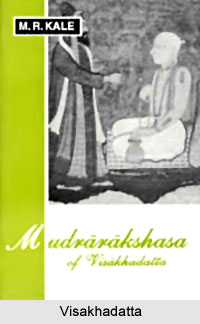 Visakhadatta was one of the popular dramatists of the Gupta period. He was the author of the Mudra- Rakshasa i.e. `Rakshasa`s Signet Ring` and Devicandra-guptam. There is no definite evidence about the date of this famous author. Different speculations have been made by scholars. His writings and the texts suggests that he came from a noble or even royal lineage.
Visakhadatta was one of the popular dramatists of the Gupta period. He was the author of the Mudra- Rakshasa i.e. `Rakshasa`s Signet Ring` and Devicandra-guptam. There is no definite evidence about the date of this famous author. Different speculations have been made by scholars. His writings and the texts suggests that he came from a noble or even royal lineage.
The Mudra-raksasa is a political drama based on Chanakya-Chandragupta episode, which led to the foundation of the Mauryan society. Its merit has been underrated because it does not conform to the normal model. Mudra-Rakshasa is a nataka in seven acts, on the reconciliation of Rakshasa. He was the minister of Nanda, the late king of Pataliputra, with Chanakya or Kautilya. He was Brahman and minister of Emperor Chandragupta Maurya , who overthrew Nanda. The entire plot revolves round Rakshasa`s ring found by Chanakya`s spy at the door of Chandanadasa. Chandanadasa was a friend of Rakshasa. Chanakya uses this seal to forge letters by Rakshasa, in order to create suspicion in the mind of King Malayaketu with whom Rakshasa has taken refuge. After Malayaketu dismisses him, Rakshasa comes to know that Chanakya is about to put Chandanadasa to death. He surrenders himself to effect Chandanadasa`s release. Ultimately, Kautilya makes Rakshasa the minister, abandoning his own post in the true spirit of a learned Brahman detached from all desire for office and power.
It is a unique text in Sanskrit theatre, with a plot wholly political and historical in nature. This was an excellent example of a war of espionage and counter-espionage fought by two ministers as well. The language is vigorous, and Visakhadatta creates powerful dramatic characterization. Another special feature is that it is difficult to determine the real hero i.e. Kautilya, Rakshasa, or Chandragupta. Thus the play defies the norms of a nataka and of rasa experience. It also provides a literary record of some of the most important events in Indian history.
His second drama, Devichandraguptam is not available in full but its quotations are preserved in the Natyadarpana of Gunacandra and Ramacandra. This drama is political in its theme. While the former depicts the political condition at the time of the accession of Chandragupta Maurya, the latter depicts another Chandragupta and his accession to throne after putting his brother to death.
Thus, both the dramas of Visakhadatta are political in nature as they depict historical character and historical events.




















